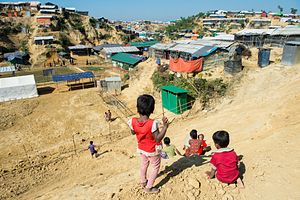Since August 2017, hundreds of thousands of Rohingya people – a majority-Muslim ethnic group from Myanmar’s Rakhine state – have been subjected to extreme violence and persecution, forced to flee from their homes to the Cox’s Bazar district in Bangladesh. Traditionally, when we think of refugees and their needs, we focus on addressing the most urgent needs – access to food, water, shelter, and basic medical care. What may not immediately come to mind is that many refugees arrive to refugee camps with significant pre-existing health conditions.
In the midst of the extreme challenges faced by those in the makeshift settlements, Smile Train – an organization which champions sustainable solutions for cleft care in developing countries – saw a way in which they could assist in Bangladesh. Over the past several months, the organization has worked to redefine healthcare delivery for refugees by offering free cleft surgery and other specialized cleft care services, such as infant feeding support for mothers to post-surgery speech services for children.
A photographer recently traveled to Cox’s Bazar on behalf of Smile Train to capture footage to help outsiders better grasp the difficult conditions faced by the Rohingya people.
The following photos outline his journey.
Susannah Schaefer is Executive Vice Chair and CEO, Smile Train.










































